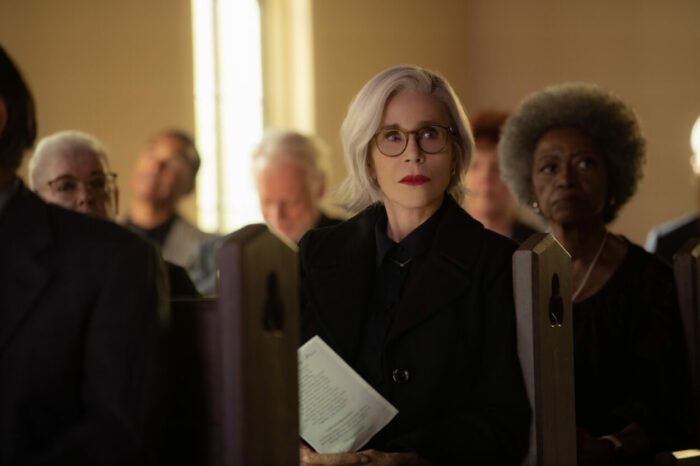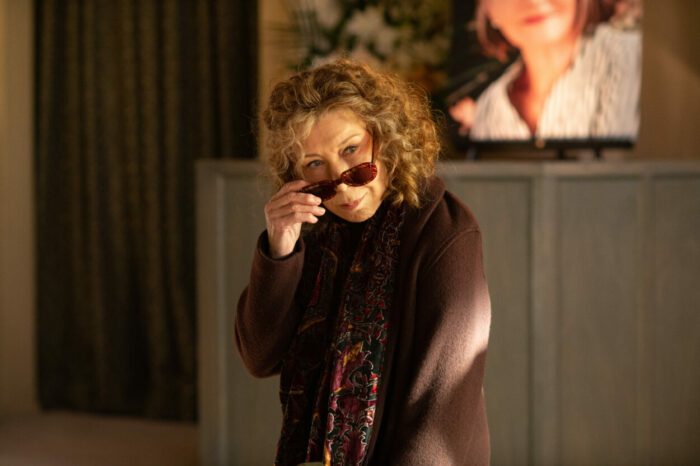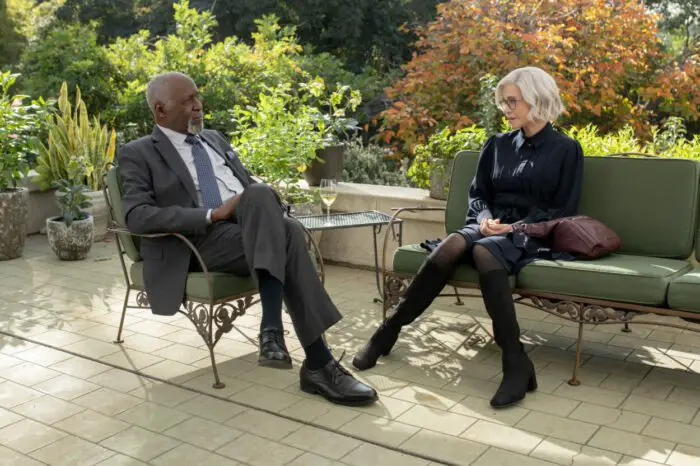It’s not spectacular; it’s not bad; it’s okay. Jane Fonda and Lily Tomlin are dulled by the muddled melancholy of Moving On. Creating such a middle-of-the-road film with such an outstanding cast and admirable writer/director almost feels impressive.
Jane Fonda and Lily Tomlin are a dynamic duo; they’re an incredible pair, but we know that from their decades of partnering in various iterations of their bantering chemistry. It becomes evident in the first 15 minutes that these estranged friends spent 50 years keeping an SA a secret from their recently deceased friend, Joyce, because her now-widowed husband, Howard (Malcolm McDowell), was the culprit.

The vision for this story is clear; it’s meant to be a dramatic tale about grief, forgiveness and, as the film’s title tells us, “Moving On”, with dark satirical comedic moments. While we’re being introduced to these characters through long-winded scenes, their melancholy manifests in their characterisation and varying attachment styles to those around them.
Age plays an interesting role in Moving On. The main characters are seniors, and the years have affected their bodies, minds and perspectives on life. Evelyn (Lily Tomlin) is at first ashamed to show Claire (Jane Fonda) that she lives in an old folk home; she also has arthritis that prevents her from continuing to play the cello. And Claire spent decades letting trauma hold her back from being happy, which manifests now in a plot for revenge against her rapist.

It’s a slow paced and quiet film. And I feel that despite the talent and pedigree of Tomlin and Fonda, the shyness of the film’s atmosphere played a damper on the actress’s bond. Paul Weitz’s perspective underlying Moving On’s story signifies a deep understanding of the effects of trauma and what they can do to a person’s life. His writing integrates varying degrees of shame and generational insights and differences. Yet not every storyline he introduced finds a suitable resolution in 2023’s context.
Moving On faces many challenges as a story unpacking the aftermath of events that happened decades prior. While Lily Tomlin’s character is the ex-roommate/lover of the recently deceased friend, Joyce, a secret which they kept even from their mutual friend Claire (Jane Fonda), and come out with at Joyce’s wake is a fascinating detail playing into the messy affairs of these three best friends who fell out of touch. The introduction of gender identity explorer James (Marcel Nahapetian) could have created an excellent juxtaposition in generational understanding and how today offers more comfort to those exploring their queerness. Yet, Paul Weitz shows James’ parents dismiss his gender curiosity, and ultimately we’re left without a smooth resolution for James’s sake which feels like a significant oversight. Aside from specific plot points, it felt like this identity storyline did little for James’ character; it felt entirely contrived to establish Evelyn’s queerness and maternal qualities and little to better this kid’s home life. Considering that James’s story is much more topical and exciting narrative, I think this was a massive mistake on Paul Weitz’s part.

Then we have Claire’s ex-husband and the nuances of their relationship. I think I can tell this was written and directed by a man because the ex-husband, Ralph (Richard Roundtree), didn’t have to pry very hard and understood right away that when Claire said “something happened”, he got it, he understood she was sexually assaulted, I don’t think that’s the reality. You might say, well, Isobel, it’s a movie, it’s fiction, it doesn’t have to be realistic, to which I would say, considering the rest of this film’s narrative plays quite heavily into the reality of things, this particular moment is a little out of place. Perhaps it was edited down to save time; perhaps because he’s a black man, he’s meant to be mystically wise about trauma. Who knows why it was written and portrayed this way, but I struggle to see how simple a conversation could fit in with the rest of the film.
Moving On provides a semi-happy ending for the two main besties. Still, I somehow feel like Joyce’s daughter, Allie (Sarah Burns), was punished for her father’s mistakes. I would have appreciated it if there was some spoken agreement that Claire and Evelyn checked in on and participated in Joyce’s grandchildren’s lives. Something that connected the three women on the level of a deeper understanding.
Moving On dives into some weighty topics but barely strives to scratch the surface of their implications on these characters’ lives and those around them. And although Lily Tomlin and Jane Fonda are spectacular actors, their shine was dulled by the thin coating of melancholy over this entire script. There were too many characters whose lives were upended by this plot and weren’t given their moment to readjust. I think Paul Weitz was onto something with this script, but it wasn’t ready for production; it needed some fine-tuning.


